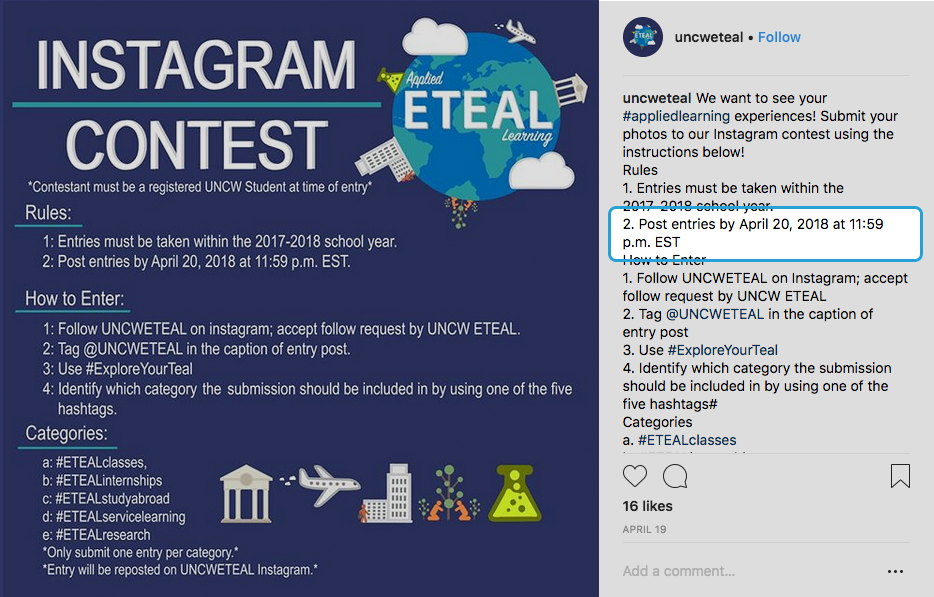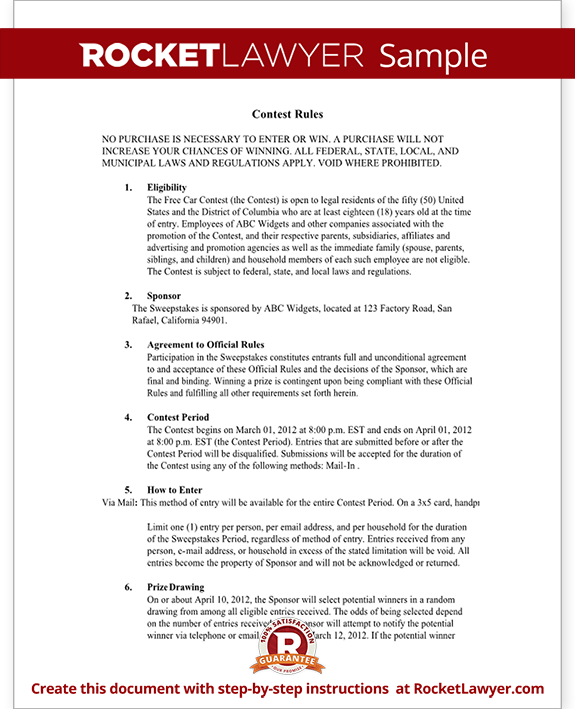How to Create Rules for Your Contest
Boosting your sales and increasing engagement through contest organization is the right decision to make. If you think that this is a timeworn approach – you simply don’t know how to nail together a contest that will make your brand sparkle even on a shoestring budget.
Whether you’re about to realize a truly unique contest idea or online campaigns of the same format are managed by you every day, you have to take a good care of writing contest rules. Right, even if you feel like your clients are rebellious rule breakers, they still need rule makers. After all, what can they break, if there’re no rules?
No, seriously. Setting up contest rules helps set precise targets and provides people with essential guidelines for engagement. Let’s analyze what meaningful contest rules mean to your campaign.
Determine the goal of the contest
I know, I know… You’ve heard this a hundred times already. Still, this statement isn’t going to lose it’s “golden rule” status soon. If you know what outcomes you want to achieve by running a contest, you’ll be more likely to set the right general contest rules.
- Start your contest goals’ analysis by focusing on the target market. Segment your audience based on geography, demographics, and social media use.
- Secondly, think of what benefits a contest should bring in to your brand, product or service. Maybe you need immediate sales or want to increase buzz around your new product launch? Is it website traffic? Brainstorm. Analyze. Strike.
- Last point: contest goal planning is just the right time for choosing evaluation metrics. Don’t forget about making your success measurable, while setting up rules for contest.
Contest hosting platforms: social networks vs. websites
There are diverse platforms, on which your contest can be hosted, the major of them being social networks and websites. How should you decide where to locate a contest? – Look into its key parameters and, again, target goals.
- Format. Consider a format that your contest should appear in, as well as the content types that potential participants will be supposed to submit. For example, if you plan on running sweepstakes, which are only set on encouraging people to enter, social networks will, obviously, work great for this. In case it’s a video contest, go for a website to enable better quality and deliver a convenient submission page.
- Time frame. You know that social media posts don’t live long. Therefore, if you’re setting up contest rules for a long-term perspective, a website is your choice.
- Audience. You know it perfectly well who should react to your contest in the first place. The key benefit of social networks is that they provide space for reaching out to large audiences and random users, who can possibly convert into participants. Not your aim? Then opt for website contests and set a distinct target.
Writing official rules by sections
To create perfect contest rules and regulations, write them based on some set rules. Even if it’s too much for your non-perfectionist nature, go through the following tips for writing contest rules. Your audience will be grateful!
So how to write rules for contest? The answer: section by section.
#1. NAME OF SPONSOR(S).
Sponsorship information is the key must-be section, especially for social media contests. Thus, if you’re running a contest on Facebook, Instagram or Twitter, you’re obliged to acknowledge that it is in no way sponsored or administered by the social network platform. Listing the actual contest sponsors is a rule and a benefit for you, because it helps build client loyalty, increases contest credibility, and serves as the key contest transparence sign. Not to mention the advantages you can derive from partnering with sponsors who want to showcase their brands.
#2. ELIGIBILITY.
The second stage in writing basic contest rules is making it clear who can be considered for participation. Try to provide as much details on eligibility criteria as possible to prevent misunderstandings and enable successful contest engagement.
#3. HOW AND WHEN TO ENTER.
Deadline it. Emphasize the date of a contest start and its closure, provide award nomination letters in time to give your audience a time frame. Even if an online competition is going to be up yearlong, make the deadline date crystal-clear for everyone.
The core of setting up rules for contest is providing the informative guidance on how to enter. Remember: the more understandable your “how” is – the bigger number of people will submit their applications, for even the tiniest sign of obscurity can make a person leave your contest page for good.
#4. HOW AND WHEN WINNERS WILL BE SELECTED AND NOTIFIED.
This is something that each of your contest participants looks ahead to. Announcing the winners is the most anticipated contest part. Provide the constructive explanation of judging criteria along with the information on winners’ selection, notification, and awarding.
ProTip: Build a hype around contest winners’ announcement. Count the days, send notifications, spice it up with some fun posts, and voila: a brand-new, active community at your disposal! Use contest rules generator.
#5. PRIZE(S).
Use a prize incentive to reward users’ engagement and motivate people for participation. But don’t just throw a chocolate into your contest winner – rewarding has to be meaningful. The first and the greatest: align it with your brand. This way, you’ll boost your product/service recognition and spread a word about yourself throughout the audience groups. To liven it up, diversify the prizes for different contest categories or match them with seasonal trends.
#6. RELEASES.
Capitalize on contest promotion with the help of informative and engaging releases. If your contest is well-constructed and you have a strong strategy for its promotion, don’t hesitate about pushing your contest offerings.
#7. MISCELLANEOUS / WINNERS’ LIST.
Let your contestants know where their names can appear! Launch a strategy for miscellaneous / winners’ list featuring. Maybe you want to hold an interview with the winners in the end or promote winners’ list on social media or some other platforms? Mention it in the contest rules. Who knows, maybe this will be just the right thing for persuading the audience to participate!
Contest rules examples
Let’s check out some contest rules designs for a better putting contest rules into your own contest landing page.




How do you make contest rules that really convert? Here are seven steps for implementing the rules so that you run a contest that converts like crazy:
- Set goals and a budget.
Establish SMART goals for the KPIs you want to reach. Your social media contest will provide you value that includes brand or product engagement boost, growth of your email list, user-generated content, and more if goals are set correctly and are reflected clearly in your rules.
- Choose the prizes.
There can be no contest without prizes. Come up with the best possible prize offers: extra products or services from you or related brands (partners), vacations or unique experiences, other gifts, or just cash. State what the prize will be in your rules.
- Determine the contest terms and conditions.
Depending on your contest type and the rules you determine, you should write the contest rules and terms and conditions to promote your competition to the right audience. Each type of contest comes with its own considerations (photo submissions would require specific submission guidelines and a basis for judging the winner, etc.).
- Include the length and frequency of your contest.
You should include the length and frequency of your contest in the rules for the best implementation. Limit your audience to make the most out of the contest participation.
- Divide contest rules by social media used.
If you organize your contest and set the rules on a particular social media platform, research these first to fully understand the rules for each social network you plan to use!
Use the best contest rules samples and templates.
You should present the rules appropriately to your audience so they know they are participating in a legitimate contest.
Measure the results.
After you write the rules, participants will follow them and leave their emails, like and share, and provide other materials. Based on this, you can then analyse the contest’s success and make provisions for future contests.
Contest rules templates
Here’s also some contest rules template that will be useful:




For more contest rules examples and automated solutions in terms of contest planning, get started for free.
Learn how to write and organise your contest rules and regulations with us. Good luck!
